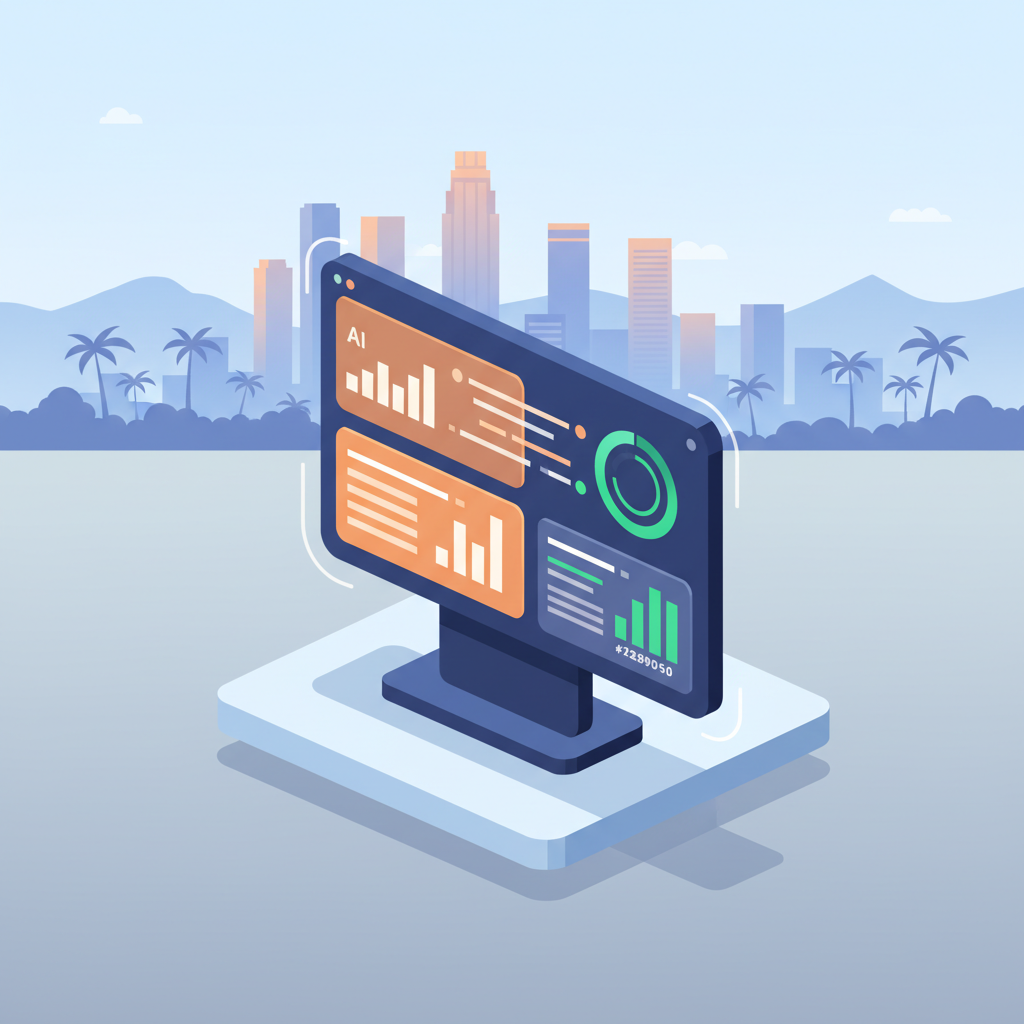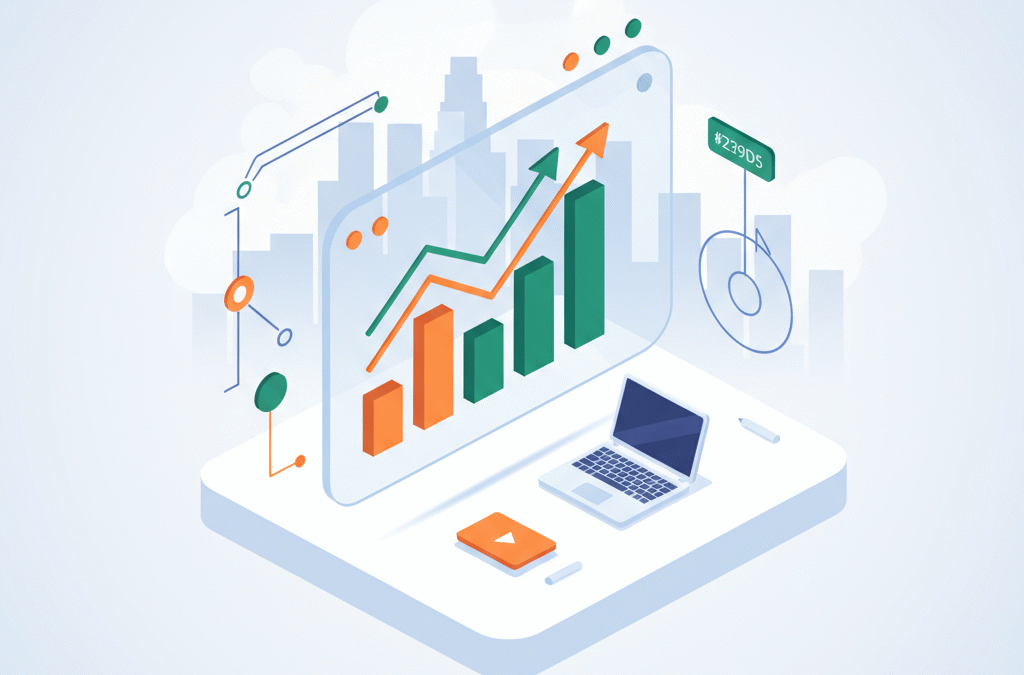Key Takeaways
- Los Angeles ecommerce brands face intense competition in the digital marketplace.
- Traditional SEO agencies are focusing on outdated ranking factors.
- 63% of shopping occasions now start with AI-powered search.
- ChatGPT’s 2.5 billion daily prompts are changing how customers find products.
- Adapting to AI search is crucial for ecommerce growth in Los Angeles.
Table of Contents
- Why Ecommerce SEO in Los Angeles is Different, and Non-Negotiable for Growth
- Los Angeles Ecommerce SEO Services, Full Spectrum Breakdown & What Actually Moves the Needle
- Core Ranking Factors for LA Online Stores in 2025 (And How the Game Has Changed)
- Local SEO vs. National Ecommerce SEO, Which Should Los Angeles Brands Prioritize?
- The Role of Keyword Research, Owning the Conversation (Not Just the SERP)
- Technical Ecommerce SEO, Solutions for LA Stores Scaling on Shopify & WooCommerce
- Product, Collection, and Content Optimization, LA-Smart Page Tactics for 2025
Los Angeles Ecommerce SEO Services, Your Growth Engine in the Era of AI Search
Los Angeles ecommerce brands are operating in the most competitive digital marketplace in the world, and the rules just changed. While traditional SEO agencies are still chasing yesterday’s ranking factors, smart brands are adapting to a reality where 63% of shopping occasions begin with AI-powered search, and ChatGPT’s 2.5 billion daily prompts are reshaping how customers discover products. Smart brands are adapting to a reality where 63% of shopping occasions begin with AI-powered search.
I’m Vijay Jacob, founder of ESSO Co, and I’ve spent the last two years helping 7 and 8-figure brands navigate this shift. Our clients under management combine for over $250M in annual revenue, and they’re winning because they understand something most don’t: los angeles ecommerce seo services aren’t just about ranking anymore, they’re about being mentioned, recommended, and trusted by AI answer engines that increasingly control the buying journey.
The brands thriving in LA’s hyper-competitive landscape aren’t just optimizing for Google’s blue links. They’re building always-on AI content systems that capture traffic from Perplexity, ChatGPT, and Google’s AI Overviews simultaneously. That’s what we call Agentic SEO, and it’s the difference between getting left behind and achieving compounding growth.
Why Ecommerce SEO in Los Angeles is Different, and Non-Negotiable for Growth
LA’s ecommerce ecosystem moves faster and hits harder than anywhere else. Fashion brands launch collections weekly, beauty trends shift overnight, and wellness products can explode from TikTok virality to mainstream adoption in days. This velocity creates unique SEO challenges that generic agencies simply can’t handle.
The data tells the story: LA-based searches show 40% higher mobile usage than the national average, with voice search queries growing 35% year-over-year. Local modifiers like “near me,” “LA delivery,” and neighborhood-specific terms now appear in 60% of product searches. Meanwhile, cultural diversity drives micro-market opportunities, Korean beauty, Latino fashion, vegan wellness, that require hyper-targeted content strategies.
Key Stat: LA ecommerce brands that optimize for both traditional search and AI answer engines see 3.2x higher organic traffic growth compared to those using standard SEO approaches.
What makes LA different isn’t just competition, it’s the sophistication of the buyers. They research across multiple channels, compare extensively, and expect immediate answers. That’s why los angeles ecommerce seo services must be built for speed, cultural relevance, and omnichannel visibility from day one.
Los Angeles Ecommerce SEO Services, Full Spectrum Breakdown & What Actually Moves the Needle

Most agencies sell you a task list: keyword research, on-page optimization, link building. That’s 2019 thinking. Today’s growth comes from systems that work while you sleep, always-on AI content engines that publish, optimize, and interlink at scale while maintaining human-level quality control.
| Traditional Agency Approach | ESSO Co’s Agentic Stack |
|---|---|
| Monthly keyword reports | Real-time AI prompt monitoring |
| Manual content creation | Always-on content systems |
| Google-only optimization | Multi-engine AEO/GEO strategy |
| Quarterly strategy reviews | Daily algorithmic adjustments |
| Generic deliverables | LA-specific cultural targeting |
Our 100-Day Traffic Sprint framework prioritizes what actually moves revenue: AI-optimized product pages, programmatic content hubs, and structured data that wins both search snippets and AI recommendations. One Shopify beauty brand saw 340% organic traffic growth in 90 days because we built systems that scale with LA’s pace, not against it.
The difference isn’t just speed, it’s strategic depth. While others optimize individual pages, we build content ecosystems that compound. Every blog post, FAQ, and buying guide becomes a traffic asset that works across Google, Perplexity, and ChatGPT simultaneously. Learn more about building content ecosystems that compound in our blog.
Core Ranking Factors for LA Online Stores in 2025 (And How the Game Has Changed)
Google’s algorithm updates combined with AI answer engine preferences have reshuffled the ranking deck. Technical excellence remains foundational, but the new differentiators are semantic depth, freshness signals, and structured data that AI can parse and recommend.
Speed matters more in LA than anywhere else, mobile page load times under 2.5 seconds are non-negotiable when competing against brands with same-day delivery expectations. But beyond the basics, AI-era ranking factors include answer-engine optimization, schema markup that feeds AI recommendations, and content freshness that matches trend cycles.
Critical Insight: AI Overviews now appear in 13% of all searches, up 2x since January. LA fashion and beauty queries show even higher rates, meaning your content must be optimized for AI citation, not just ranking.
The scorecard for 2025 includes: Core Web Vitals under Google’s thresholds, structured data for products and reviews, mobile-first design with thumb-friendly navigation, local business schema for multi-location brands, and content that answers specific questions AI engines commonly surface. Miss any piece and you risk being left behind. For a deeper dive into the evolution of search engine optimization, see this overview on search engine optimization.
Local SEO vs. National Ecommerce SEO, Which Should Los Angeles Brands Prioritize?
The answer depends on your business model, but most LA ecommerce brands benefit from a hybrid approach. Pure national SEO works for digital products and unique items with nationwide appeal. Local SEO dominates for brands with physical locations, same-day delivery, or products tied to LA culture and lifestyle.
Consider a Beverly Hills skincare brand: their “luxury anti-aging serum” targets national searches, while “same-day skincare delivery Beverly Hills” captures high-intent local buyers willing to pay premium prices. The local queries often convert 3x higher because they indicate immediate purchase intent and geographic proximity.
| Strategy | Best For | Traffic Volume | Conversion Rate | Competition Level |
|---|---|---|---|---|
| National SEO | Unique products, digital goods | High volume | Lower (2-4%) | Extremely competitive |
| Local SEO | Physical stores, local delivery | Moderate volume | Higher (6-12%) | Manageable with expertise |
| Hybrid Approach | Multi-location brands | Balanced growth | Optimized funnel | Strategic advantage |
| Strategy Type | Best For | Key Ranking Factors | Traffic Value |
|---|---|---|---|
| Local SEO | Physical stores, local delivery, geo-specific products | Google Business Profile, NAP consistency, local reviews | Higher conversion rates, premium pricing tolerance |
| National SEO | Digital products, unique items, broad market appeal | Domain authority, content depth, backlink profile | Higher volume, broader reach, scalable growth |
| Hybrid Approach | Multi-location brands, premium products with local presence | Combined signals, structured local + product schema | Best of both: volume + conversion optimization |
Smart LA brands optimize their Google Business Profile even for pure ecommerce plays. Local citations and reviews create trust signals that influence national rankings, while “near me” searches increasingly drive same-day purchase decisions across all product categories. Explore more insights on our main site.
The Role of Keyword Research, Owning the Conversation (Not Just the SERP)
Traditional keyword research focuses on search volume and competition metrics. AI-era keyword research maps the entire customer conversation, from initial awareness through post-purchase advocacy. Los angeles ecommerce seo services that still rely on basic keyword tools miss the semantic clusters that drive actual revenue.
The process starts with intent classification: informational queries (“how to choose running shoes”), navigational searches (“Nike store locations LA”), and transactional keywords (“buy trail running shoes online”). But the real opportunity lies in conversational long-tail phrases that voice search and AI assistants surface: “best running shoes for LA weather” or “where to buy eco-friendly sneakers near me.”
LA Ecommerce Keyword Mapping Process
- Seed Analysis: Extract top-performing keywords from Google Search Console
- Semantic Expansion: Use AI tools to identify question-based and conversational variants
- Local Modifiers: Layer in LA-specific geo-terms and neighborhood qualifiers
- Intent Clustering: Group keywords by buyer journey stage and content type
- AI Prompt Research: Test how your keywords perform in ChatGPT and Perplexity queries

